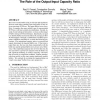Free Online Productivity Tools
i2Speak
i2Symbol
i2OCR
iTex2Img
iWeb2Print
iWeb2Shot
i2Type
iPdf2Split
iPdf2Merge
i2Bopomofo
i2Arabic
i2Style
i2Image
i2PDF
iLatex2Rtf
Sci2ools
146
click to vote
CONEXT
2007
ACM
2007
ACM
Router buffer sizing revisited: the role of the output/input capacity ratio
The issue of router buffer sizing is still open and significant. Previous work either considers open-loop traffic or only analyzes persistent TCP flows. This paper differs in two ways. First, it considers the more realistic case of non-persistent TCP flows with heavy-tailed size distribution. Second, instead of only looking at link metrics, we focus on the impact of buffer sizing on TCP performance. Specifically, our goal is to find the buffer size that maximizes the average per-flow TCP throughput. Through a combination of testbed experiments, simulation, and analysis, we reach the following conclusions. The output/input capacity ratio at a network link largely determines the required buffer size. If that ratio is larger than one, the loss rate drops exponentially with the buffer size and the optimal buffer size is close to zero. Otherwise, if the output/input capacity ratio is lower than one, the loss rate follows a power-law reduction with the buffer size and significant buffering ...
Buffer Size | Computer Networks | CONEXT 2007 | Output/input Capacity Ratio | Required Buffer Size |
| Added | 14 Aug 2010 |
| Updated | 14 Aug 2010 |
| Type | Conference |
| Year | 2007 |
| Where | CONEXT |
| Authors | Ravi S. Prasad, Constantine Dovrolis, Marina Thottan |
Comments (0)

